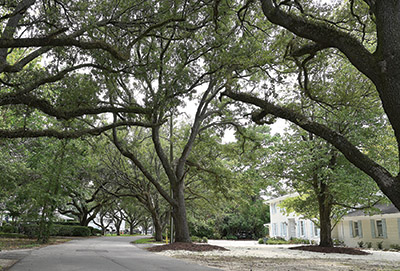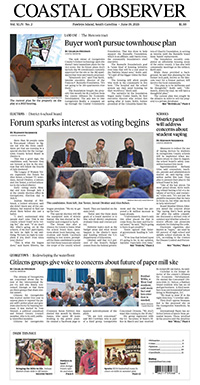Tourism
Flaw in city’s code leaves vacation rentals out in the cold

You can book a night in a home in Georgetown’s historic district or a loft on the waterfront, but unless the owner is living there the short-term vacation rental isn’t legal.
“They’re not legal and they’ve never been legal,” said Robert Cox, the city’s interim planning director.
He estimated that there are over 100 of the short-term rentals in the city. The city didn’t intend to outlaw them, but a change to the zoning ordinance in 2017 that adopted a definition of short-term vacation rentals failed to show them as an approved use in any zoning district.
“Short-term rentals at this moment cannot technically be allowed within the city limits,” Peter Gaytan, the zoning administrator, told the City Council at a workshop this week.
The staff found the flaw in the ordinance when the owner of property on River Road who initially planned to operate a bed and breakfast asked about short-term vacation rentals instead.
“The River Road house became very sensitive to the neighborhood. That’s what brought this all up,” Cox said.
The council asked the staff to come back in September with a recommendation.
But the staff already did that in a memo to the council last month: allow the rentals in all zoning district and limit their number. They said that can be enacted by November.
The town of Mount Pleasant caps its short-term rentals at 400, and has a waiting list of 250 properties, Gaytan said.
“That way it doesn’t overwhelm their town,” he said.
He proposed a cap of 200 to 250 for Georgetown.
The zoning restriction doesn’t apply to bed and breakfast operations because those are treated differently from other rentals. They are allowed only if the property is the owner’s primary residence, limited to no more than nine rooms and require an off-street parking space for each room.
“When I knock on the door, the owner should open it,” Cox said.
In Georgetown County, renting out individual rooms in a house where the owner also lives makes the property a “boarding house.” Those aren’t allowed, said Holly Richardson, the county planning director.
“We honestly have to treat those on a case-by-case basis,” she said. “Sometimes we’ll get a complaint.”
But the county makes no distinction between short- and long-term rentals. Either is considered a residential use.
“It’s not something we’ve chosen to regulate,” Richardson said.
The only exception is for “accessory dwellings,” which the county allows as a means to provide additional housing. Those dwellings, sometimes called “mother-in-law suites,” can’t be rented for less than 90 days.
The city of Georgetown treats short-term rentals as commercial activity, which requires a business license. The rentals are also subject to state and local accommodations taxes.
While the treatment of rentals can impact the city’s revenues, Cox said there is also a safety issue.
“We have some very unsafe short-term rentals,” he said.
Commercial structures are inspected by the fire marshal, but short-term rentals are in residential structures, Cox said. He wants the city to adopt annual inspections for those rentals.
Council Member Jim Clements said he raised the issue of short-term rentals earlier this year because of the effect of absentee owners and transient visitors on established neighborhoods.
“I’m not against short-term rentals, but we need to rationalize them for the sake of quiet enjoyment of all the neighborhoods and communities,” he said.
And Clements added that revenue is not a factor. “This is about protecting our residents and citizens. If the city benefits in the process, that’s great,” he said.
Council Member Hobson Milton said the revenue does make a difference. “Short-term rentals are not a bad thing, right?” he said. “We should boost short-term rentals, not kill it.”
There is a bill pending in the state legislature that would penalize local governments that ban short-term rentals. It was included as a proviso in this year’s budget, but removed in conference committee.
“There’s a lot of support for that,” said state Rep. Lee Hewitt, a Murrells Inlet Republican, who sponsored the bill.
The bill would require localities that ban the rental to assess those properties at the 4 percent residential rate rather than the 6 percent commercial rate.
When the state adopted a tax reform bill, known as Act 388, “cities and counties came to the table and said rentals cause us to provide more services,” Hewitt said. So it only makes sense to reduce the tax rate if rentals aren’t allowed. “The cities and counties don’t like it.”
Hewitt said he understands the concerns about absentee landlords. He believes that can be solved through regulation and licensing. “There are ways to solve the problems without just a total ban,” he said.
Georgetown officials stressed that what now looks like a ban was unintentional.
“We do not have the correct ordinance for anything,” Mayor Carol Jayroe said. “So we’ve got to fix what is wrong.”




